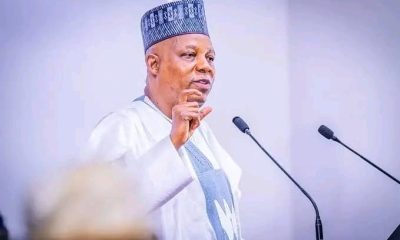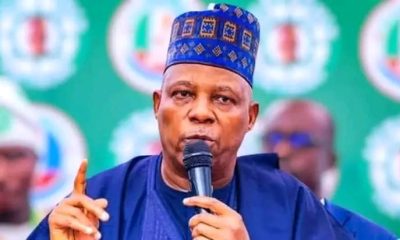National
Report Lists Unemployment, Insecurity, Lack Of Trust in Governance, Other Challenges As Major Impediments To Nigeria’s Development

By Alkassim Bala Tsakuwa, Abuja
The State of the Nigerian Youth Report 2025 has raised alarm over the worsening of challenges of unemployment, insecurity and deepening lack of trust in governance that are affecting and making Nigerian youths and pushing them into cycles of vulnerability and exclusion are of great concern to Nigeria.
The report produced by Plan International Nigeria in collaboration with Action Aid Nigeria and contributions from policy and advocacy experts was presented by the Advocacy and Youth Programme Officer at Plan International Nigeria, Jonathan Abakpa, Esq at the Nigerian Youth Dialogue in commemoration of the International Youth Day organized by the House of Representatives Committee on Youth In Parliament on Thursday.
Presenting the report, he painted a troubling picture of wasted opportunities in Nigeria where over 60 percent of the population is below the age of 30.
The report revealed that nearly 80 million young Nigerians are unemployed, representing 53 percent of the youth population. Each year, about 1.7 million graduates leave tertiary institutions, but jobs remain elusive.
He said, “This is not just a statistic,” Abakpa noted. “It represents shattered dreams and wasted talent. The desperation is pushing many into irregular migration, cybercrime, and other risky coping mechanisms.
“With more than 200 million people and one of the largest youth populations in the world, Nigeria should be a powerhouse of innovation and growth. But the reality is stark: unemployment, insecurity, poverty, and poor infrastructure continue to weigh heavily on young people. Unless urgent action is taken, the country risks losing its greatest asset”.
He quoted the National Bureau of Statistics report which states that, there was a 5.3 percent rise in youth unemployment in the first quarter of 2024 saying that, although there was a slight improvement in the second quarter, the situation remains dire.
Beyond joblessness, the report stated that, insecurity was a major factor shaping the lives of young Nigerians.
The report stated, “The tragedy of insecurity is not only the loss of lives but also the collapse of opportunities. Over 1,500 schools have been shut down in the past two years, leaving one million children out of school. Education, which should be a ladder of opportunity, has been violently pulled away from them.”
It further revealed that, more than 600,000 people have been killed and 2.2 million kidnapped in recent years adding that, many of the victims are young people.
The report further noted that, over 77,000 lives have been lost to tribal conflicts in the last five years, while 2.6 million people mainly from farming areas, have been displaced. With farmers unable to access their lands adding that, UNICEF has warned that 25 million Nigerians risk facing hunger.
According to the report, 40.1 percent of Nigerians, over 82.9 million people, live in poverty which it said, deepens the struggle for survival.
Abakpa noted that, Poverty is not just about empty pockets, it is about restricted choices and wasted futures.
According to him, The report listed Corruption as a major barrier to progress because it drains resources meant for development and further erodes trust in governance.
He noted that, infrastructure gaps like bad roads, unreliable electricity and digital exclusion, were also identified as obstacles preventing youth from converting ambition into meaningful enterprise.
He said, “Without these basics, youth energy cannot translate into innovation or enterprise. Their potential remains locked away by systemic neglect”.
While giving highlights of findings from the ‘We Listen Survey’ which formed the foundation of the report, he informed that, it showed how youth concerns vary across Nigeria.
According to the findings, unemployment, high cost of living, and insecurity dominated the responses in the North Central while kidnapping and banditry were described as the most pressing threats in the North West and North East.
However, inflation and underemployment stood out, reflecting the burden of rising living costs were dominant in the responses in the South West and South East while lack of access to education, poverty, and unemployment were most frequently cited in the South South.
He added, “These findings show that while the challenges are national, they manifest differently depending on the region,” Abakpa explained. “Solutions must be context-specific, not one-size-fits-all.”
Abakpa noted that, the most sobering aspect of the report is how young Nigerians perceive government responsiveness.
According to him, majority of respondents in the survey rated it as “poor” or “very poor,” which he said reflects a “deep trust deficit between Nigerian youth and the state.
He warned that, “Many young people no longer believe government policies are designed for their good. That disconnect must be urgently addressed if we are to avoid alienation of an entire generation”.
The report however stressed that, despite the grim realities, Nigerian youth are not only victims but also innovators and change-makers saying that, many are already shaping the country’s cultural and economic landscape from technology entrepreneurship to creative industries.
Abakpa said, “The strength of our youth lies not only in their numbers but also in their adaptability and hunger for change.What they demand is not charity but justice, opportunity, and dignity.
The report urged government, the private sector, and development partners to urgently expand job creation initiatives while ensuring that vocational training and entrepreneurship schemes are effectively linked to industries.
It also stressed the need for access to credit to allow small enterprises to thrive and create sustainable pathways to decent work.
Abakpa while speaking on insecurity, argued that the solution cannot rely solely on military action. He therefore called for community-based peace building initiatives, early warning systems, and rehabilitation support for victims of violence.
He said, “Schools must be made safe, and young people engaged as active agents of peace, not sidelined as victims of war”.
The report advocated for stronger social protection programmes targeted at marginalised groups such as girls, persons with disabilities, and rural youth. It also called for anti-corruption reforms, including stronger accountability institutions, transparent budgeting processes, and civic participation to restore public trust.
Abakpa said investment in infrastructure like roads, electricity, digital networks, and education facilities must be prioritized because they are the foundations of development adding that, without them, talent remains locked away while providing them will bring out the potentials in Nigerian youths.
According to him, one of the boldest proposals of the report is a call to enshrine Universal Basic Education as a constitutional right.
Abakpa said, “Education must be non-negotiable. If enshrined in the Constitution, no child would be denied learning due to insecurity, poverty, or geography. A nation that denies its youth education is a nation mortgaging its future.
The report call for a new social contract between the Nigerian state and its young people.
He said, “Youth are not leaders of tomorrow, they are partners of today. “Nigeria stands at a crossroads. The time for rhetoric is over. The time for responsive leadership and accountable governance is now. This report is a mirror held up to the nation. What we see is a generation ready to lead, if only given the space, the tools, and the trust”.
In his address, the Chairman, House Committee on Youth in Parliament, Hon. Ayodeji Alao-Akala, restated his commitment to advancing youth-focused policies, describing Nigerian youths as the future of the nation.
He said the National Assembly had devoted significant time to passing bills and motions aimed at creating a more enabling environment for young people to thrive.
Hon. Akala said, “As a country, we cannot afford to ignore the aspirations of our youths. They are the future of Nigeria, and our responsibility as lawmakers is to ensure their potential is harnessed for national development”.
The lawmaker who described himself as one of the youthful members of parliament, said that he remains passionate about ensuring that legislation coming out of the House of Representatives directly impacts young people.
He stressed that policy makers and relevant agencies must ensure the next generation of Nigerians do not experience the same challenges their parents faced.
He added, “Our task as leaders is to make sure the children of tomorrow inherit a country better than what we met, with more opportunities and less hardship”.
The Committee Chairman assured that his committee would continue to work closely with stakeholders to strengthen youth development programmes and policies that prepare young Nigerians for leadership, innovation, and economic productivity.













